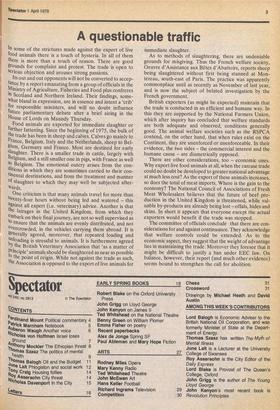A questionable traffic
In some of the strictures made against the export of live food animals there is a touch of hysteria. In all of them there is more than a touch of reason. There are good grounds for complaint and protest. The trade is open to serious objection and arouses strong passions.
Its out and out opponents will not be converted to acceptance by a report emanating from a group of officials in the Ministry of Agriculture, Fisheries and Food plus confreres tu Scotland and Northern Ireland. Their findings, somewhat bland in expression, are in essence and intent a 'crib' for responsible ministers, and will no doubt influence future parliamentary debate after a brief airing in the House of Lords on Maundy Thursday. Food animals are exported for immediate slaughter or further fattening. Since the beginning of 1975, the bulk of the trade has been in sheep and calves. Calves go mainly to France, Belgium, Italy and the Netherlands, sheep to Belgium, Germany and France. Most are destined for early Slaughter. There is a smaller trade in cattle, largely with 8eigium, and a still smaller one in pigs, with France as well as Belgium. The emotional outcry arises from the conditions in which they are sometimes carried to their continental destinations, and from the treatment and manner of slaughter to which they may well be subjected afterwards.
One criticism is that many animals travel for more than tv'enty-four hours without being fed and watered — this against all expert (i.e. veterinary) advice. Another is that the lairages in the United Kingdom, from which they embark on their final journey, are not so well supervised as to ensure that the animals are evenly distributed, and not overcrowded, in the vehicles carrying them abroad. It is generally agreed, moreover, that repeated loading and nloading is stressful to animals. It is furthermore agreed °Y. the British Veterinary Association that 'as a matter of Principle' animals should be slaughtered as near as possible to the point of origin. While not against the trade as such, the Association is opposed to the export of live animals for immediate slaughter.
As to methods of slaughtering, there are undeniable grounds for misgiving. Thus the French welfare society, Oeuvre d'Assistance aux Bêtes d'Abattoirs, reports sheep being slaughtered without first being stunned at Montereau, south-east of Paris. The practice was apparently commonplace until as recently as November of last year, and is now the subject of belated investigation by the French government.
British exporters (as might be expected) maintain that the trade is conducted in an efficient and humane way. In this they are supported by the National Farmers Union, which after inquiry has concluded that welfare standards are both adequate and observed, conditions generally good. The animal welfare societies such as the RSPCA contend, on the other hand, that when rules exist on the Continent, they are unenforced or unenforceable. In their evidence, the two sides — the commercial interest and the humane cause — are diametrically opposed.
There are other considerations, too — economic ones. Why export live food animals at all, when the carcase trade could no doubt be developed to greater national advantage at much less cost? As the export of these animals increases, so does the total of meat imports. Where is the gain to the economy? The National Council of Associations of Fresh Meat Wholesalers believes that the future of beef production in the United Kingdom is threatened, while val uable by-products are already being lost — offals, hides and skins. In short it appears that everyone except the actual exporters would benefit if the trade was stopped.
The committee of officials conclude that there are considerations for and against continuance. They acknowledge that welfare controls could be extended. As to the economic aspect, they suggest that the weight of advantage lies in maintaining the trade. Moreover they foresee that it might be difficult to justify a ban under EEC law. On balance, however, their report (and much other evidence) seems bound to strengthen the call for abolition.


































 Previous page
Previous page